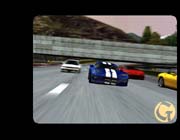|
Mastering the System
Many people's first introduction to video games were to titles like Asteroids, Donkey Kong, Pac-Man and Space Invaders. Each of these games offered a little slice of unreality that one could slip into by taking the controls of a space ship or leaping flaming barrels. While the actions performed and presented
 reasons for playing the games were all very different, all of these games shared the same focus of gameplay. Each game presented the player with a system of rules and a way to control their character in the game and success was only granted as the player learned to use these systems. As the levels progressed the game became harder and harder, until only people who had truly mastered the systems could progress as the probability of sheer luck in reacting to the games became nearly impossible.
reasons for playing the games were all very different, all of these games shared the same focus of gameplay. Each game presented the player with a system of rules and a way to control their character in the game and success was only granted as the player learned to use these systems. As the levels progressed the game became harder and harder, until only people who had truly mastered the systems could progress as the probability of sheer luck in reacting to the games became nearly impossible.
 This idea is focusing the gameplay on the system of rules and the controls is such a common element of gameplay that it is our first focus of gameplay, the system focus.
This idea is focusing the gameplay on the system of rules and the controls is such a common element of gameplay that it is our first focus of gameplay, the system focus.
A game is using a system focus when the player is playing the game for the fun of performing the actions and using the rules of the game. Games that use the system focus for gameplay include: fighting games, most simulation games such as driving games, Tetris, Pinball games, sports event games like Football, and Chess among others.
 In a driving game such as Gran Turismo for the Playstation, the player is given a controller and a set of rules which make up the physics of the cars as they are driving. While the player's goal for the game is to beat the other racers and get the best times in the tracks, the gameplay is to handle the car around the track as fast as possible which necessitates that the player learn the game's and car's particular system of physics. This learning and then performing of the learned knowledge in the game's system is what is fun about driving games. All the cars that are available to the player, and the different tracks they can race on and trophies they can race for, provide an extra incentive by filling out the environment for the player, but it is the system of controlling and racing the cars that is the central purpose in driving games.
In a driving game such as Gran Turismo for the Playstation, the player is given a controller and a set of rules which make up the physics of the cars as they are driving. While the player's goal for the game is to beat the other racers and get the best times in the tracks, the gameplay is to handle the car around the track as fast as possible which necessitates that the player learn the game's and car's particular system of physics. This learning and then performing of the learned knowledge in the game's system is what is fun about driving games. All the cars that are available to the player, and the different tracks they can race on and trophies they can race for, provide an extra incentive by filling out the environment for the player, but it is the system of controlling and racing the cars that is the central purpose in driving games.
 While this is fairly easy to see in driving or fighting games, it becomes a little less clear in a game such as Chess. In Chess there are a variety of different actions that each piece has and the player can perform. All of the actions have to be thought out in advance to understand what territory could possibly be gained or lost in the quest to check mate the other player's king. There is no real interface to chess beyond physically moving the pieces and this is hardly where players get enjoyment from. It is understanding the rules and applying them against the opponent that is the gameplay focus of Chess.
While this is fairly easy to see in driving or fighting games, it becomes a little less clear in a game such as Chess. In Chess there are a variety of different actions that each piece has and the player can perform. All of the actions have to be thought out in advance to understand what territory could possibly be gained or lost in the quest to check mate the other player's king. There is no real interface to chess beyond physically moving the pieces and this is hardly where players get enjoyment from. It is understanding the rules and applying them against the opponent that is the gameplay focus of Chess.
Successfully out thinking an opponent and using the pieces in the optimum way to dismantle the offensive moves and defensive positions is the system that Chess provides for players to master.
|
